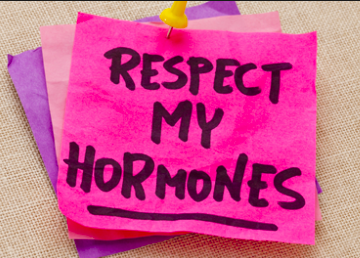16 Sep Is there a problem with low carb diets?
Is low-carb the way to go?
Don’t swear off carbs quite yet! You may want to hear what my good friend and best-selling author Ari Whitten has to say about the problems with low carb diets.
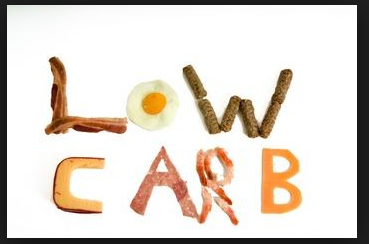
Ari is the best selling author of Forever Fat Loss and the creator of cutting-edge program The Energy Blueprint. (By the way, he’s got an incredible FREE training on how to increase your energy levels. It’s a MUST WATCH for anyone who cares about being healthy, increase their energy or wants to lose fat. You can sign up for that 100% FREE Virtual Training HERE.) His website is www.theenergyblueprint.com
*NOTE: Before reading on it is important to note that this article does not claim to be a treatment or cure for any disease. If you have a serious medical condition, see your doctor and take appropriate action.
The problem with low carb diets – by Ari Whitten
In this article, I am going to introduce you to what may just seem like some very radical ideas. You’re about to learn:
That carbs do not make you fat.
That low-carb diets have no scientifically proven beneficial effect on fat loss, and that well-designed higher carbohydrate diets achieve equal or better fat loss, and typically better performance, energy, and health too.
That the weight loss many people achieve on low-carb diets is not due to carbohydrate restriction, but is actually due to shifts in the amount of whole foods and protein a person eats.
Not only is low-carb eating not particularly beneficial, but in many cases, if you do it long enough, it can result in severe hormonal dysfunction and a slower metabolism.
Perhaps this all seems hard to believe right now. (After all, I’m sure you’ve heard so many gurus over the last five years tell you all about those evil $%^*bohydrates!) So read on, and I’ll show you the science behind carbohydrates, and why you may be doing more harm than good with your carbohydrate avoidance.
The history of low carb dieting
In the 1980s and 1990s, low-fat mania was at full force and the nation was swept with fat-o-phobia. Fat, we were told by all the experts, was bad for us, and we should all strive to eat low-fat diets. This was supposed to fix the obesity epidemic in the U.S. The problem, however, is that for the next couple decades, rates of obesity and diabetes continued to increase just as they had been doing before.
This observation led to a reactionary movement that we now know as the low-carb movement. The low-carb movement was built on the notion that the low-fat movement had not only failed to address rising rates of obesity, but that eating a higher carbohydrate, low-fat diet was actually making the obesity epidemic worse. (Important note: These allegations are in fact, false, since Americans never did actually lower their fat intakes, but that is largely beside the point for our purposes in this article). Nevertheless, the story–according to the newly emerging low-carb gurus–was that really fats were not to blame, and that not only were fats not to blame, but carbohydrates were the major cause of the obesity epidemic.
Low-carb gurus told us that if we want to be healthy and avoid becoming fat and diabetic, we better send back the bread basket, opt for the “sugar-free” and “low-carb” snacks, order salad instead of mashed potatoes, and order hamburgers wrapped in lettuce instead of a bun. In the last decade, the low-carb movement has become so popular that it is to the point where if you ask almost anyone off the street how to lose fat, they will advise you to “cut back on the carbs.” You can even expect them to recite the typical low-carb line “fat doesn’t make you fat–carbs do!”
The central mantra of the low-carb gurus is basically this: “Avoid those evil disease and obesity-inducing carbohydrates and sugars, and you will become a lean mean fat-burning machine, blessed with astounding levels of health, vitality, boundless energy!”
I was convinced that low carb dieting was the way to go
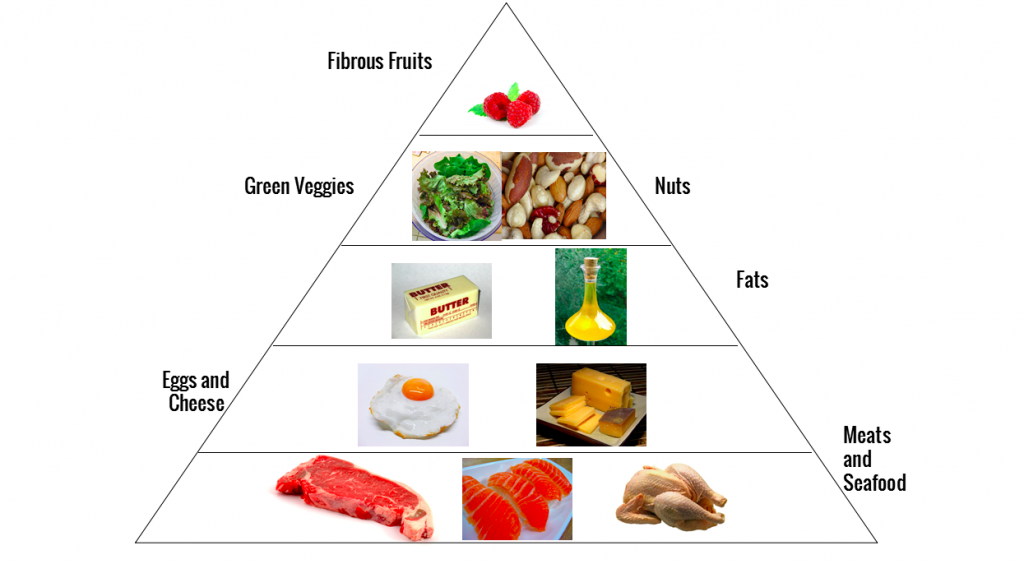 I know that mantra well. In fact, for over a decade of my life, I myself was a strict low-carb dieter. I was convinced that carbs would spike my insulin levels and give me diabetes, that they would lock my body fat away so I couldn’t burn it (I would be “sugar burner” instead of a “fat burner”), that fat was the “preferred” fuel source of my body, and that all of my Paleolithic ancestors ate “low-carb.” I was convinced that low-carb was the way to go not only for fat loss but even for performance and for health too. My diet was basically chicken and broccoli, almond butter with celery, eggs and sausage, steak and asparagus, turkey and avocado, and of course, lots and lots of salads. This is pretty much how I ate for a decade—tons of protein and fat, and avoiding carbs as much as possible. In fact, I even advocated this way of eating to my clients for years, and wrote about it in the original version of the Supershred program.
I know that mantra well. In fact, for over a decade of my life, I myself was a strict low-carb dieter. I was convinced that carbs would spike my insulin levels and give me diabetes, that they would lock my body fat away so I couldn’t burn it (I would be “sugar burner” instead of a “fat burner”), that fat was the “preferred” fuel source of my body, and that all of my Paleolithic ancestors ate “low-carb.” I was convinced that low-carb was the way to go not only for fat loss but even for performance and for health too. My diet was basically chicken and broccoli, almond butter with celery, eggs and sausage, steak and asparagus, turkey and avocado, and of course, lots and lots of salads. This is pretty much how I ate for a decade—tons of protein and fat, and avoiding carbs as much as possible. In fact, I even advocated this way of eating to my clients for years, and wrote about it in the original version of the Supershred program.
But about three years ago, I began to discover that the science conflicted with many low-carb dogmas. And as my beliefs about carbohydrates were proven wrong by the science, I slowly began to change my views.
This culminated in a rather remarkable realization: Nearly every single premise for why we should avoid carbohydrates is, to put it simply, wrong.
Do carbs really make you fat?
Now, there are far too many myths about carbohydrates to cover in just one article, so here I’ll just focus on one. The one we’re going to discuss here is perhaps the most important of all the myths around carbohydrates–the one that really sparked the current trend of villainizing carbohydrates and insulin, and ignited the popularity of low-carb dieting.
This is “The Carbohydrate Theory of Fat Gain.”
The theory is very simple, and we’ve all heard the simple version of it: “Carbs make us fat.”
In more scientific terms, it would look more like what “Diet Doctor” Andreas Eenfeldt states here:
“Carbohydrates – > insulin – > obesity Thus more carbohydrates lead to more insulin which leads to more fat accumulation.” According to this logic, the solution–the way to get fat loss–is very simple. “Less carbs – > lower insulin levels – > loss of excess fat” (http://www.dietdoctor.com/yes-a-low-carb-diet-greatly-lowers-your-insulin)
The logic is basically this: Carbs cause your body to secrete insulin, which is a “fat storing” hormone, and the more often you stimulate insulin by eating carbs, the fatter you get.
It’s pretty simple and straightforward, right? And even pretty logical—if you are constantly boosting a “fat storing” hormone several times a day, that’s probably what is making you fat. Pretty simple hypothesis, and it seems to make sense, so what could possibly be wrong with it?
Well, as it turns out, just about everything.
Low carb diets offer no fat loss benefit
The research has proven over and over again that when low-carb diets are compared to higher carb diets of equal calories, low-carb diets offer no benefits whatsoever for fat loss. Nada. Zilch.
This was the conclusion from the latest meta-analysis (review of the scientific studies) on the subject just published just a few weeks ago: “There is probably little or no difference in weight loss and changes in cardiovascular risk factors up to two years of follow-up when overweight and obese adults, with or without type 2 diabetes, are randomized to low CHO (low-carb) diets and Isoenergetic balance (higher carb diets that are equal in calories).” (SOURCE: HERE )
In other words, looking at all these different studies that compared people on low-carb and higher carb diets, they were not able to detect any difference whatsoever in either health measures or fat loss.
So is the meta-analysis mentioned above telling us something novel?
Not really. As it turns out, there are dozens of studies which have found this conclusion, going back several decades.
Even when we compare higher carb diets to extremely low carbohydrate diets, we see the same thing: No difference in fat loss.
A relatively recent trial examined the effects of 3 diets consisting of roughly 1400 kcals each for 12 weeks. The diets had the following macronutrient proportions: a) very low fat and high carb (70% carb), b) moderate carb (50% carb), and c) very low carb (4% carb). What did they find? There were no differences in fat loss between the groups.
Another recent trial compared two 1500 calorie diets, a moderate carbohydrate diet (40% carbohydrate) and a very low-carb ketogenic diet (a tiny 5% carbohydrate). The researchers concluded that the “diets were equally effective in reducing body weight and insulin resistance, but the ketogenic low-carb diet was associated with several adverse metabolic and emotional effects.” In other words, going low carb did not accomplish any additional fat loss–all it did was make people feel worse.
Virtually every metabolic ward study that has been conducted on the subject since 1935 has repeatedly shown that calories are equal; there is no difference in fat loss between low-carb and high-carb diets.
To put this very simply: Carbs do not make you fat.
 So Why Do Some People Lose Weight on Low-Carb Diets?
So Why Do Some People Lose Weight on Low-Carb Diets?
There is however, still one glaring thing we have to account for: the many thousands of people who have lost lots of weight by following low-carb diets.
Notice that I have not said “low-carb diets has never been shown to cause weight loss and improve health.” In fact, numerous studies have shown that they have. The point is that when compared to well-designed higher carbohydrate dietary interventions of equal calories, low-carb diets are consistently shown NOT to have benefits beyond those higher carb diets of equal calories. It is of course, possible to cherry pick the studies to support either the notion that low-carb is the best diet, that low-fat is the best diet, or that vegan diets are the best. Because there are studies showing profound health and fat loss benefits for all of these. The simple fact is that people routinely achieve tons of weight loss–and thus, a dramatic improvement of health–on all sorts of diets, from low-carb Paleo diets, to omnivorous low-fat high-carb diets, to ultra high-carb vegan diets. So a particular individual losing lots of weight and transforming their health from going low-carb is not uncommon. It is likewise not uncommon to find people achieving the same levels of fat loss and health transformation from eating a high-carb low-fat diet, or an ultra high-carb vegan diet. All of these–if done right–can lead to remarkable weight loss, and the associated health improvement from that weight loss.
The simple fact is that low-carb diets do indeed frequently work to cause weight loss in overweight people and can radically transform a person’s health as a result of that weight loss. And we have studies that prove that. Just as we do with low-fat diets and vegan diets.
Thus it is an unquestionable and indisputable fact that low-carb diets can result in profound weight loss and improvement of health.
The part that is highly questionable and disputable is whether that weight loss has anything whatsoever to do with carbohydrates.
How could weight loss on low-carb diets not have to do with carbohydrates, you ask?
Here’s why: Most low-carb diets (such as “Paleo” diets, for example) are not only built around avoiding carbs, they are also typically whole-foods diets, and high-protein diets.
In other words, adoptees of these diets typically go from eating a lower protein diet with lots of processed foods, to a diet of mostly whole-foods with a significantly higher protein intake.
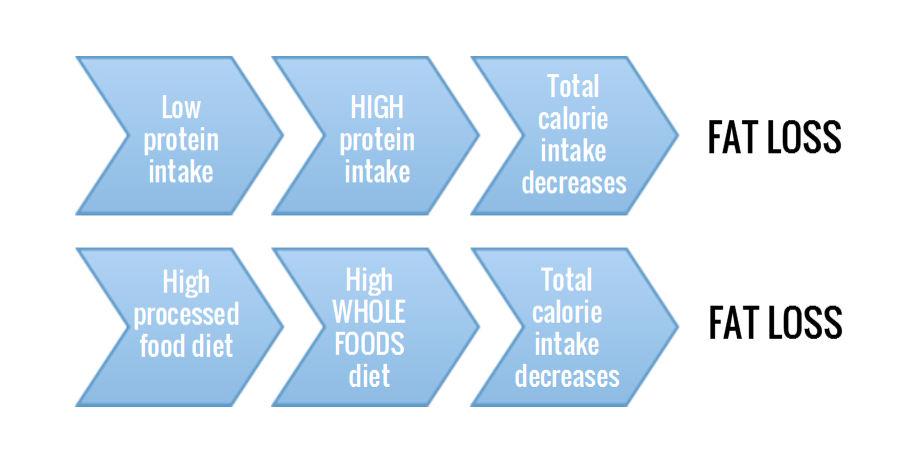
Why are those two factors–whole foods and protein intake–so significant? Simple: They are both scientifically proven to spontaneously (without conscious awareness) lower overall calorie intake.
(Note: The removal of ANY major food group from the diet–i.e. carbs, fat, animal proteins–is known to result in a spontaneous decrease in total calories consumed, even without instructing a person to lower their calorie intake).
Combine all of those things together, and you have a potent recipe for fat loss. And that has absolutely nothing to do with carbohydrates.
So how can we test to figure out whether the weight loss that many people experience on low-carb diets is actually due to some effect from the lack of carbohydrates/insulin, or whether it is simply due to increased protein intake lowering overall calorie intake? Well, lucky for us, there is actually a recent study that looked at precisely that. Here’s what they concluded:
In other words, whether you eat lots of carbs or very few has no bearing on how much fat you lose. The primary factor that is actually responsible for fat loss is protein intake, not carbohydrate intake. Secondary to that, the removal of a major food group from the diet, and the shift to more whole foods that takes place on most intelligently designed low-carb diets, all act to drive down calories consumed, and thus cause weight loss.
Basically, what’s really going on with low-carb diets is this: You shift from processed foods to whole foods, you increase your protein intake, and you simultaneously remove a major food group from the diet. This combination causes a large drop in calories consumed, and boom, weight loss.
Now, to be clear, there is nothing wrong with higher protein intakes and whole foods diets causing this effect. To the contrary, these two factors are the major players responsible when someone actually does achieve fat loss success on any diet. The point however, is that the same exact effect–the same amount of fat loss–is achieved on a high carb low-fat diet that is equally rich in protein and whole foods. (See HERE, HERE, HERE, HERE, and HERE). Ultra-high carb vegan diets also have proven to have this effect. (Although, to be clear, I am definitely not advocating a vegan diet as the best path to health).
The main variables responsible for lowering calorie intake and causing fat loss are:
1) The removal of any major food group from the diet (i.e. low-carb, low-fat, vegan)
2) The shift from processed foods to whole foods
3) Increased protein intake
The presence of one, two, or all of these three factors will cause a spontaneous reduction in caloric intake, and will induce weight loss, which in turn, will profoundly improve health in those who are overweight.
So Why Eat Carbs? One Simple Reason: Better Hormonal Health
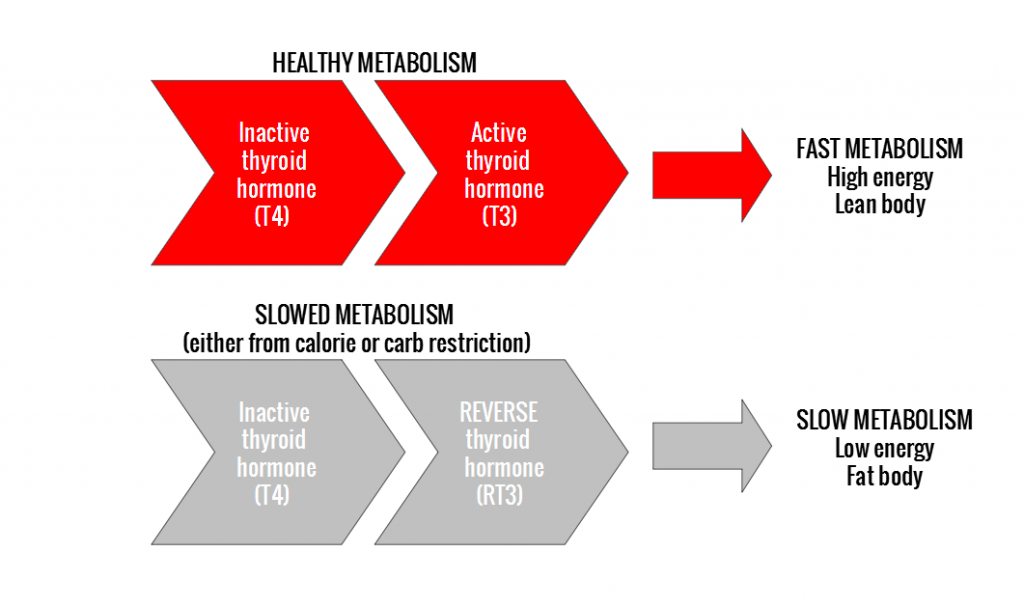 While there is a place for very low-carb (ketogenic) diets in the treatment of certain disease states (i.e. neurological diseases, cancers, epilepsy, etc.), in most cases, low-carb diets are a basically worthless dietary habit that will lead to needless deprivation and no health benefits that couldn’t have been achieved without carb deprivation. But let me take this one step further than just saying that carbohydrate restriction is a basically worthless dietary habit: In many cases, low-carb diets actively cause severe harm to hormonal and metabolic function.
While there is a place for very low-carb (ketogenic) diets in the treatment of certain disease states (i.e. neurological diseases, cancers, epilepsy, etc.), in most cases, low-carb diets are a basically worthless dietary habit that will lead to needless deprivation and no health benefits that couldn’t have been achieved without carb deprivation. But let me take this one step further than just saying that carbohydrate restriction is a basically worthless dietary habit: In many cases, low-carb diets actively cause severe harm to hormonal and metabolic function.
Low-carb diets can contribute to amenorrhea and menstrual irregularities, as well as a condition called “low T3 syndrome,” where a person has chronically low levels of active thyroid hormone (T3). This is very significant because thyroid hormone is the major regulator of your metabolic rate. When T3 is low, your metabolism slows down dramatically.
In this condition, a person may have normal thyroid gland function, but is still exhibiting all the usual symptoms of hypothyroidism like fatigue, weight gain, cold hands and feet, and a body that is extremely resistant to fat loss. The reason why is basically this: In a healthy person with a strong metabolism, inactive thyroid hormone (T4) is converted to active thyroid hormone (T3) in abundance. What happens either in a state of calorie restriction of chronic carbohydrate restriction is that instead of being converted to active thyroid hormone (T3), T4 starts being converted into Reverse T3 (RT3). RT3 blocks T3 from doing its job of powering your metabolism. So as levels of active thyroid hormone (T3) drop and Reverse T3 accumulates, your metabolism slows down and you can get hypothyroid symptoms.
To put this in simple terms, carbohydrate restriction tends to slow down your metabolism.
(Important note: Most physicians do not test for Reverse T3 and thus almost never pick up low T3 syndrome–so it is extremely common for people who have this
very real hormonal problem–and symptoms like fatigue and weight gain–to be told by their doctor “your thyroid is normal”).
I have personally dealt with numerous clients who have wrecked their metabolic function from years of low carb eating. When they initially come to me, they often say something to the effect of “I don’t understand why I am so overweight and I can’t lose weight–I eat almost no carbs.”
Several studies have now confirmed that very low carb diets can dramatically reduce T3 and increase Reverse T3. (Supporting research HERE and HERE.) When this happens, it wreaks all sorts of hormonal havoc on the body. Not just fatigue and weight gain, but hair falling out, loss of the menstrual cycle, and all sorts of symptoms of hormonal imbalance. These hormonal and metabolic issues are becoming epidemics now with the popularity of low-carb diets over the last decade. And it is particularly insidious, as this is happening most commonly in health conscious people–people who are doing this to themselves because they think it’s “healthy.” So they often don’t even realize why they’re having all these hormonal and metabolic issues when they go to such great lengths to avoid carbs and eat “healthy.”
I have seen absolutely miraculous effects with many my female clients–especially the ones who come to me struggling with fatigue and hormonal issues on their low-carb diets–simply by shifting them to higher carbohydrate intakes. And now you don’t just have to take my word for it, a new study lends credence to exactly what I’ve been doing with my clients. It showed that in exercise-induced hormonal and cellular dysfunction in female rats, the simple addition of more carbohydrate in the diet produces a radical transformation of their hormonal profile, restored healthy menstrual cycles, and rejuvenated the damaged mitochondria of the cells (the cellular energy generators that power the metabolism). (Supporting research HERE and HERE.)
It turns out that the hormonal dysfunction in hard-exercising, low-carb eating women can be fixed with some simple and tasty medicine: CARBS!
Carbs are not your enemy
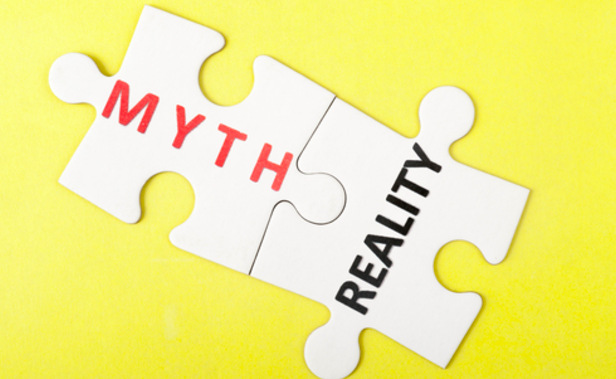 I hope that at this point, you can see that a lot of the ideas around carbohydrates that have been promoted by the low-carb movement are not only wrong, but in some cases, actually backwards.
I hope that at this point, you can see that a lot of the ideas around carbohydrates that have been promoted by the low-carb movement are not only wrong, but in some cases, actually backwards.
If you’ve been restricting carbs in your diet thinking that you’re doing something that’s “healthy” and you now find yourself dealing with hormonal issues and the typical signs of a slow metabolism (fatigue, menstrual irregularities, lack of weight loss despite eating clean and working out hard, etc.), eating more carbs (from whole food sources) is one the single most important steps you can take to get back your energy and recover your hormonal/metabolic health.
Take Home Lessons:
1) Carbohydrates are not the cause–or even a cause–of the obesity epidemic. The Carbohydrate Hypothesis of Fat Gain/Obesity is wrong.
2) The amount of carbs in your diet has nothing to do with how fat or lean you are. A 500 calorie excess on either a low-carb or high-carb diet will cause the same exact amount of fat gain. A 500 calorie deficit on either diet will cause the same exact amount of fat loss. At a given level of calories, you will gain or lose the same exact amount of fat on either diet.
3) Low-carb diets have no beneficial effect on fat loss. Well-designed higher carbohydrate diets achieve equal or better fat loss, and typically better performance, energy, and health too.
4) The weight loss many people achieve on low-carb diets is not due to carbohydrate restriction. It is due to a decrease in total calorie intake driven by the shift to more whole foods and more protein. Learn from this! If you want fat loss, make sure you’re eating a whole foods diet (i.e. minimal to no processed foods) and that you have a high protein intake.
5) Not only is low-carb eating not particularly beneficial. In many cases, if you do it long enough, it can result in severe hormonal dysfunction and a slower metabolism.
6) If you’ve been eating low carb for years and now find yourself with all the typical symptoms of a slow metabolism, liberating yourself from low-carb dogmas and eating more carbohydrates (from whole foods) is powerful medicine.
_________________________________________________________________________________________
Are you ready to take your body and energy to the next level?
Ari has put together what may just be the most advanced and cutting-edge, science-packed health program in the world. It’s called The Energy Blueprint and people are absolutely raving about it. He offers an amazing “Overcome Fatigue and Double Your Energy” FREE Virtual Training course that is a MUST WATCH for anyone who cares about their health and wants more energy. You can sign up for that HERE.
___________________________
Ari’s website, The Energy Blueprint, can be found at www.theenergyblueprint.com
If you’re looking to improve your body and your energy levels, make sure to sign up for Ari’s incredible FREE “Double Your Energy” Video Training course HERE.
———————————————————————————————————
REFERENCES:
[1] http://www.dietdoctor.com/yes-a-low-carb-diet-greatly-lowers-your-insulin
[1] http://www.dietdoctor.com/yes-a-low-carb-diet-greatly-lowers-your-insulin
[1] Reference: Naude CE, Schoonees A, Senekal M, Young T, Garner P, et al. (2014) Low Carbohydrate versus Isoenergetic Balanced Diets for Reducing Weight and Cardiovascular Risk: A Systematic Review and Meta-Analysis. PLoS ONE 9(7): e100652. doi:10.1371/journal.pone.0100652
[1] Noakes M, et al. Comparison of isocaloric very low carbohydrate/high saturated fat and high carbohydrate/low saturated fat diets on body composition and cardiovascular risk. Nutr Metab (Lond). 2006 Jan 11;3:7.
[1] Johnstone CS, et al. Ketogenic low-carbohydrate diets have no metabolic advantage over nonketogenic low-carbohydrate diets. Am J Clin Nutr. 2006 May;83(5):1055-61.
[1] Colpo, A. (2012, June 29). Finally, a study that proves a low-carb metabolic advantage? Yeah, Right… Retrieved from http://anthonycolpo.com/finally-a-study-that-proves-a-low-carb-metabolic-advantage-yeah-right/
[1] Schoeller, D. A., & Buchholz, A. C. (2005). Energetics of obesity and weight control: Does diet composition matter? J Am Diet Assoc, 105(5 Suppl 1), S24-8.
[1] Hill JO, et al. (1993). Obesity treatment: can diet compositon play a role? Ann Intern Med.;119:694-7.
[1] Freedman MR, et al. (2001). Popular Diets A Scientific Review. Obesity Research. Vol.9 Suppl. 1 March
[1] Golay A, et al. (1996). Similar weight loss with low or high carbohydrate diets. Am J Clin Nutr. 63:174-8.
[1] Alford BB, et al. (1990). The effects of variation in carbohydrate, protein, and fat content of the diet upon weight loss, blood values, and nutrient intake of adult obese women. J AM Diet Assoc. 90:534-40.
[1] http://www.ncbi.nlm.nih.gov/pubmed/22935440
[1] Anderson KE, et al. Diet-hormone interactions: protein/carbohydrate ratio alters reciprocally the plasma levels of testosterone and cortisol and their respective binding globulins in man. Life Sci. 1987 May 4;40(18):1761-8.
[1] Serog P, et al. Effects of slimming and composition of diets on V02 and thyroid hormones in healthy subjects. Am J Clin Nutr. 1982;35(1):24-35.
[1] Lane AR, Duke JW, Hackney AC. Influence of dietary carbohydrate intake on the free testosterone: cortisol ratio responses to short-term intensive exercise training. Eur J Appl Physiol. 2010 Apr;108(6):1125-31.
[1] http://suppversity.blogspot.com/2014/07/exercise-associated-menstrual.html
[1] Zhao, Can, et al. “Effects of carbohydrate supplements on exercise-induced menstrual dysfunction and ovarian subcellular structural changes in rats.” Journal of Sport and Health Science (2014).


